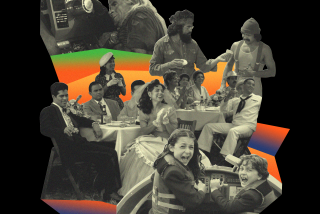Chicano Experimental Films at LACE
- Share via
“Espejos: The Search for an Experimental Identity,” a program of Chicano experimental films, screens tonight at 8 at LACE as part of Filmforum’s contribution to the citywide Artes de Mexico celebration.
Despite its formidable title, Severo Perez’s 16-minute “A Day in the Life, or Mozo: An Introduction Into the Duality of Orbital Indecision” (1968) gracefully records the solitary wanderings about town of a young man on what is apparently his day off (from either studies or work), suggesting a kind of alienation.
More involving is Willie Varela’s 10-minute “Juntos en la Vida, Unidos en la Muerte” (“Together in Life, United in Death”), a 1985 survey of a San Miguel Allende graveyard that serves as a commentary on the importance and respect accorded death in Latino culture.
Frances Salome Espana’s six-minute “El Espejo/The Mirror” (1991) intercuts shots of the filmmaker’s parents’ East L.A. back yard with shots of herself telling of a dream of “immigration,” suggesting a kind of internal conflict of cultural identity.
Also screening, but unavailable for preview, are El Teatro Campesino’s “Los Vendidos” (“The Sellouts,” 1972) and Juan Salazar’s “Entelequia” (1978). For more information: (213) 663-9568.
More Artes at LACMA: “Mexicanos ‘91,” another Artes de Mexico offering, continues Saturday at LACMA at 8 p.m. with Jose Bull’s “La Leyenda de Una Mascara” (“The Legend of a Masked Man,” 1990) and Juan Antonio de la Riva’s “Pueblo de Madera” (“Timber Town,” 1990). The first spoofs the popularity of masked wrestlers with a nod to both “Citizen Kane” and Kurosawa’s “Kagemusha.” It is frequently very funny but is so frenetic that at times it becomes wearying. Hector Bonilla stars as the Masked Angel, an immensely popular wrestler and a hero of comic books and films; upon his death, an occasion for national mourning, a reporter (Damian Alcazar) starts probing for the man behind the mask. (“La Leyenda de Una Mascara” has been playing (unsubtitled) at the Palace Theater on South Broadway).
“La Leyenda” represents a lively popular entertainment of broad appeal (but also some fairly sharp satire as well), while “Pueblo de Madera” reveals how subtle a film can be and still be in the mainstream. Taking place in the course of a summer in San Miguel de Cruces, a lumber mill village in the mountains of Durango, it is one of those films in which little out of the ordinary happens, yet we come to realize that for some of the community’s citizens nothing will ever be the same.
Information: (213) 857-6010.
Prelude to ‘Rhapsody’: As a prelude to the year-end release of Akira Kurosawa’s “Rhapsody in August,” the Monica 4-Plex is presenting five vintage Kurosawas over the next five weekends.
Launching the series is the 1948 “Drunken Angel” (11 a.m. Saturday and Sunday), which marks the beginning of Kurosawa’s 17-year collaboration with Toshiro Mifune (who Kurosawa has said had more energy and could react faster than any Japanese actor he had ever seen).
“Drunken Angel,” the film where Kurosawa himself feels he came into his own, casts the handsome young actor as a tubercular gangster opposite the veteran Takashi Shimura in the title role as an alcoholic doctor dedicated to serving the downtrodden. For all its social consciousness, “Drunken Angel” is a wonderful shadowy black-and-white film noir whose atmosphere reflects Japan’s postwar demoralization.
Information: (213) 394-9741.
Two From ‘39: Tonight’s 7:30 “Academy Standard Screenings” double feature at the Academy of Motion Picture Arts and Sciences is “The Rains Came” (1939), directed by Clarence Brown and starring Myrna Loy, Tyrone Power and George Brent, and Howard Hawks’ “Only Angels Have Wings” (1939), with Cary Grant, Jean Arthur, Richard Barthelmess and Rita Hayworth.
Information: (213) 247-3000.
More to Read
The biggest entertainment stories
Get our big stories about Hollywood, film, television, music, arts, culture and more right in your inbox as soon as they publish.
You may occasionally receive promotional content from the Los Angeles Times.










